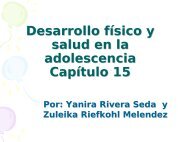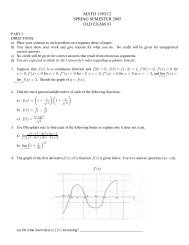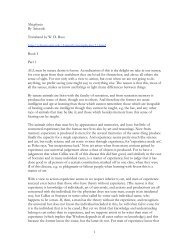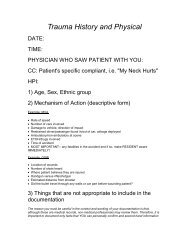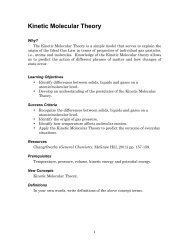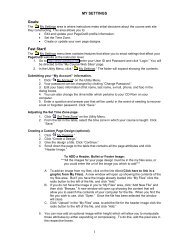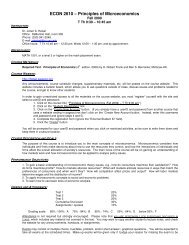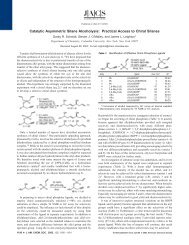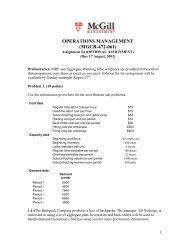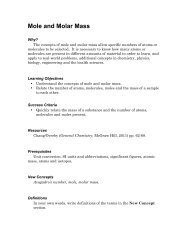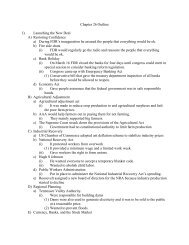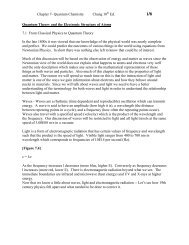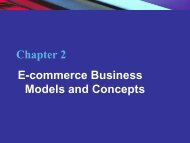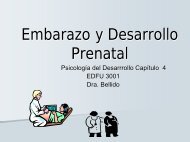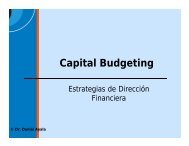Intro to Logic - PageOut
Intro to Logic - PageOut
Intro to Logic - PageOut
Create successful ePaper yourself
Turn your PDF publications into a flip-book with our unique Google optimized e-Paper software.
<strong>Intro</strong>duction <strong>to</strong> <strong>Logic</strong>: First Day Syllabus<br />
Philosophy 106; Section 4; Fall 2012; California State University, Fuller<strong>to</strong>n<br />
Instruc<strong>to</strong>r:<br />
Douglas E. Hill, Ph.D.<br />
E-mail: dohill@fuller<strong>to</strong>n.edu<br />
Location: LH-525.<br />
Office Hours: MW 2:30-3:30 pm;<br />
TuTh 1-2 pm;<br />
other times by appointment.<br />
Telephone: 657-278-6755.<br />
Meeting Information:<br />
Section 2: TuTh 8:30-9:45am, LH-304.<br />
Section 3: TuTh 10-11:15am, LH-304.<br />
Section 4: MW 1-2:15pm, MH-689.<br />
Section 6: TuTh 11:30am-12:45pm, LH-315.<br />
You must turn in all homework and take all<br />
exams in the section in which you are<br />
enrolled.<br />
REQUIRED READING: The Power of <strong>Logic</strong>: Fourth Edition or Fifth Edition, (either edition is fine) by<br />
Frances Howard-Snyder, Daniel Howard-Snyder, and Ryan Wasserman, 2009 or 2013, McGraw-<br />
Hill, New York, NY. Most of your homework will be done on the textbook’s website at:<br />
http://poweroflogic.com via our class’ website at: http://hilld.pageout.net. This book is available<br />
from the Little Professor, the Titan S<strong>to</strong>re, and online booksellers, or for rental online (with only the<br />
chapters we will cover) at: http://tinyurl.com/DrHill<strong>Logic</strong> or http://preview.tinyurl.com/DrHill<strong>Logic</strong>.<br />
The Skeptic's Dictionary: A Collection of Strange Beliefs, Amusing Deceptions, and<br />
Dangerous Delusions by Robert Todd Carroll, 2003, http://skepdic.com. This book is also available in paperback, but<br />
the version on the website is in convenient hypertext format, is updated regularly, and is free.<br />
Other readings will also be assigned.<br />
COURSE LEARNING OUTCOMES: By the end of the semester, students who pass this class will have demonstrated their<br />
ability <strong>to</strong>:<br />
1. Identify passages in natural language that are arguments and nonarguments,<br />
the component parts of an argument, as well as different<br />
types of arguments and non-arguments.<br />
2. Identify and explain the logical requirements of a valid argument, how<br />
these differ between inductive and deductive arguments, and be able <strong>to</strong><br />
classify arguments as deductive or inductive, valid or invalid, sound or<br />
unsound, strong or weak, and cogent or uncogent.<br />
3. Identify and explain the distinction between validity and soundness and<br />
<strong>to</strong> learn formal logical methods for testing the validity of an argument<br />
using categorical logic, Venn diagrams, and truth-functional logic.<br />
4. Translate arguments in<strong>to</strong> categorical and propositional forms and<br />
evaluate them using appropriate logical methods.<br />
5. Identify various formal and informal fallacies.<br />
6. Show a basic competence <strong>to</strong> apply the above skills independently<br />
when writing in-class essays and a summary of a lecture.<br />
7. Understand and explain the difference between correlation and<br />
causation.<br />
8. Gain an appreciation of just what goes in<strong>to</strong> good reasoning and good<br />
writing that will be helpful in future studies.<br />
9. Read, write, and reason at the college level.<br />
GE Learning Outcomes: This course meets requirements of G.E. Category A.3, Critical Thinking (including for<br />
Philosophy majors). The overall G.E. Learning Goals for Category A, Core Competencies, are:<br />
1. Organize one’s thoughts and communicate them clearly and effectively,<br />
using language that demonstrates sensitivity <strong>to</strong> gender and cultural<br />
differences.<br />
2. Find, evaluate, select, synthesize, organize, cite and present<br />
information and arguments clearly and effectively for a variety of<br />
purposes and audiences.<br />
3. Recognize and evaluate the features, functions, and contexts of<br />
language that express and influence meaning.<br />
The G.E. Learning Goals for Category A.3, Critical Thinking, courses are:<br />
1. Understand the role of logic and its relation <strong>to</strong> language.<br />
2. Understand elementary inductive and deductive processes, including<br />
formal and informal fallacies.<br />
3. Develop the skills <strong>to</strong> distinguish propositions and statements of fact<br />
from issues of judgment or opinion.<br />
4. Develop skills <strong>to</strong> advocate for ideas.<br />
4. Compare and contrast with care and accuracy the relative merits of<br />
alternative or opposing arguments, interpretations, assumptions, and<br />
cultural values.<br />
5. Reflect in an open-minded manner on one’s own thinking in relation <strong>to</strong><br />
the ideas of others.<br />
5. Develop skills <strong>to</strong> reach well-supported factual and judgmental<br />
conclusions and the skills <strong>to</strong> successfully advocate for these<br />
conclusions.<br />
6. Evaluate, critique, and analyze the quality and sufficiency of evidence<br />
and other forms of support for a position, include recognition of<br />
underlying lines of argument.<br />
This course is designed <strong>to</strong> achieve all of these learning goals. This course meets each of these G.E. Learning Goals<br />
through the selection of the text, the <strong>to</strong>pics considered, the skills taught, and the course assignments. The course specific<br />
learning outcomes have been designed <strong>to</strong> explicitly satisfy each of these G.E. Learning Goals. Students who successfully<br />
complete this course will be able <strong>to</strong> identify specific ways in which each of these goals was met.<br />
Philosophy 106 Page 1 of 5 Fall 2012, CSUF
GRADING: This class will use plus/minus grading. Grades will be<br />
determined using the following scale:<br />
A+ 98-100% B+ 88-89% C+ 78-79% D+ 68-69%<br />
A 92-97% B 82-87% C 72-77% D 62-67%<br />
A- 90-91% B- 80--81% C- 70-71% D- 60-61%<br />
F 0-59%<br />
Your grade will be computed as a weighted average of the course<br />
components as follows:<br />
Assignments (homework + quizzes + E.C.) 25%<br />
Midterm 1 25%<br />
Midterm 2 25%<br />
Final exam 25%<br />
A grade of “C” (2.0) or better is required <strong>to</strong> meet the General<br />
Education requirement for Category A.3. A grade of “C-” (1.7) or<br />
below will not satisfy this General Education requirement. Thus <strong>to</strong><br />
receive a “C” in this course, your weighted average must be at least<br />
72% and you must complete ALL REQUIREMENTS including<br />
acceptable lecture write-up and presentation of a logic problem.<br />
EXAMS: There will be two midterms and a cumulative final exam.<br />
The midterms are scheduled for Oc<strong>to</strong>ber 10 th and November 7 th ; the<br />
exact date will be announced in class. The final exam will be:<br />
Section Final exam time<br />
2 (TuTh 8:30am) Thursday, December 20, 9:30-11:20 a.m.<br />
3 (TuTh 10 am) Tuesday, December 18, 9:30-11:20 a.m.<br />
4 (MW 1 pm) Monday, December 17, 2:30-4:20 p.m.<br />
6 (TuTh 11:30am) Thursday, December 20, 12-1:50 p.m.<br />
The final will be cumulative. Please be on-time <strong>to</strong> each exam;<br />
latecomers will not be seated once any student has completed the<br />
exam, and no extra time will be given <strong>to</strong> latecomers. In the event of<br />
an excused absence, the final will serve as a make-up for the<br />
missed midterm. But an absence from the midterm will be excused<br />
only for extreme and documented reasons, and no other make-up<br />
midterm will be offered. You may not use any outside materials on<br />
the exams, including notes or the textbooks. You must bring your<br />
current CSUF pho<strong>to</strong> ID <strong>to</strong> the exams, along with scantron 1712, pen,<br />
and pencils.<br />
WRITING: Some of your homework and quizzes will involve writing.<br />
In particular, you can, for extra credit, attend and write up an<br />
approved lecture (such as a philosophy colloquium) and upload a<br />
two-page summary <strong>to</strong> www.turnitin.com (via TITANium) within a<br />
week of the lecture. One video lecture will be shown in class (TuTh<br />
sections) or made available online (MW section). You may also<br />
write-up another approved talk for extra credit. Writing up a talk<br />
(such as the assigned talk or an extra credit talk) is a requirement<br />
<strong>to</strong> pass the class.<br />
HOMEWORK: The homework problems will be assigned in class.<br />
Most of the homework problems will have <strong>to</strong> be done online (on a<br />
computer using the book’s website via http://hilld.pageout.net) and<br />
submitted online AHEAD OF CLASS TIME. (Instructions and<br />
details will be given in class.) Other homework that cannot be<br />
graded online will be due at the beginning of class. Please be aware<br />
that software problems are <strong>to</strong> be expected, so plan for some<br />
difficulties, especially the first time that homework is due.<br />
Your instruc<strong>to</strong>r will make every effort <strong>to</strong> assist you with the software<br />
on the website, but late online homework will only be accepted in<br />
rare circumstances at the discretion of the instruc<strong>to</strong>r. Any such<br />
extensions must be negotiated in-class on behalf of the entire<br />
class. Late arriving students may submit homework for half-credit if<br />
that homework has not yet been graded. Once an assignment has<br />
been graded, it will no longer be accepted. Each student may submit<br />
ONE assignment that was <strong>to</strong> be turned in at the beginning of class<br />
via email as long as it arrives in the instruc<strong>to</strong>r’s email box prior <strong>to</strong><br />
the start of class when that assignment was due. (Please note that<br />
this does not apply <strong>to</strong> online problems, only <strong>to</strong> homework that was <strong>to</strong><br />
be turned in on paper.)<br />
Therefore, you are advised not <strong>to</strong> put off your homework until the last<br />
minute. (Because most homework will be done online, it is easy <strong>to</strong><br />
turn it in, even if you must miss a class. If you must miss a class,<br />
please arrange for a classmate <strong>to</strong> get the homework assignment <strong>to</strong><br />
you.) Please include your name (as you wish <strong>to</strong> be addressed), date,<br />
email, and section number or time on everything that you turn in for<br />
this class. Please keep all returned homework, and make sure that it<br />
has been recorded properly on Titanium. Students will present some<br />
of the homework problems on the board. Every student must<br />
successfully present at least one homework problem in class.<br />
QUIZZES: Surprise quizzes on the assigned readings may be<br />
given anytime during class, and will count <strong>to</strong>ward your homework<br />
score. These quizzes will be closed-book but open notes; i.e., you<br />
may use your own hand-written notes but no printed material. No<br />
make-up quizzes will be offered.<br />
EXTRA CREDIT: You may attend an approved academic talk, write up<br />
a summary of the argument you heard and upload it <strong>to</strong><br />
www.turnitin.com (via TITANium) within a week of the talk for<br />
extra credit (<strong>to</strong>ward your homework score). Any CSUF Philosophy<br />
Colloquium will apply, and your instruc<strong>to</strong>r will look for and announce<br />
other qualified talks.<br />
Extra credit will be given for proof of voting in the November election.<br />
In addition, extra credit (and writing credit) will be awarded for<br />
uploading a write-up of the convention acceptance speeches of<br />
BOTH Obama and Romney; each write-up needs <strong>to</strong> be uploaded<br />
within a week from each speech. To get credit, you must write-up<br />
BOTH speeches.<br />
A few of the homework assignments will include extra credit<br />
problems. Your assignment grade will be computed from the sum of<br />
your homework, quizzes, and any extra credit and will account for<br />
25% of your grade.<br />
The instruc<strong>to</strong>r also reserves the right <strong>to</strong> award some extra credit for<br />
consistently outstanding classroom participation. There will be no<br />
other extra credit assignments.<br />
ATTENDANCE: Students must be conscientious about attending<br />
classes on a regular basis. Students are allowed three absences<br />
without prior explanation (however, full attendance will be rewarded<br />
with 2.5% added <strong>to</strong> your final average). After the third absence,<br />
every absence will constitute a 2.5% loss in the final average<br />
(approximately half a grade reduction) in your final grade. Do<br />
not squander your three absences – there are always unexpected<br />
Philosophy 106 Page 2 of 5 Fall 2012, CSUF
things that would prevent you from coming <strong>to</strong> class on a given day. If<br />
you use up your free absences, you will have <strong>to</strong> take the penalty<br />
when you do miss one more class. Students must be in class when<br />
the attendance sheet is passed around in order <strong>to</strong> get attendance<br />
credit. Students are also encouraged <strong>to</strong> attend the Professor’s office<br />
hours.<br />
PLAGIARISM AND ACADEMIC HONESTY: Plagiarism, cheating, etc. will<br />
result in a course grade of ‘F’. In addition, you will be reported <strong>to</strong> the<br />
Dean of Students office. This includes, but is not limited <strong>to</strong>, the<br />
following:<br />
Using another student’s paper as the basis for your own work (e.g.,<br />
having your friend’s paper in front of you as you type out your own);<br />
Allowing another student <strong>to</strong> use your paper;<br />
Using notes during an exam;<br />
Cutting and pasting from a website or book;<br />
Communicating with other students during an exam or quiz, copying off<br />
another student, or making your exam or quiz available for copying;<br />
Paraphrasing the work of another individual without citation; and<br />
Misrepresenting another’s work as your own. This includes passing off a<br />
quotation as your words, or editing a quotation without properly<br />
acknowledging this (with editing marks).<br />
Reading a presentation that you did not otherwise contribute <strong>to</strong>.<br />
However, at the instruc<strong>to</strong>r’s discretion, the first offense of very small<br />
scale plagiarism (which can be as little as leaving out quotation<br />
marks) may result only in an “F” on the assignment, and a discussion<br />
with the instruc<strong>to</strong>r on how this can be avoided in this and all future<br />
college classes. So please be familiar with University Policy<br />
Statement 300.021 on Academic Dishonesty. You are encouraged<br />
<strong>to</strong> discuss the material with your classmates, but you must do all your<br />
own work. Academic dishonesty will not be <strong>to</strong>lerated.<br />
INTERNET: This syllabus can be found online at Titanium which you<br />
can access via www.fuller<strong>to</strong>n.edu. Announcements will be made on<br />
our discussion forum there, and your scores will be recorded there.<br />
However, Titanium will not be used <strong>to</strong> compute your grades, so any<br />
<strong>to</strong>tals or averages there are estimates only. You will do most of<br />
your homework via hilld.pageout.net. Therefore, you will have <strong>to</strong><br />
register at that website. This also provides an email list <strong>to</strong> all<br />
sections of this class, so you should regularly check your CSUF e-<br />
mail, as well as whatever email you used <strong>to</strong> register at<br />
hilld.pageout.net.<br />
EMAIL: Please use the discussion board or email <strong>to</strong> reach the<br />
instruc<strong>to</strong>r outside of class. Any email sent <strong>to</strong> the instruc<strong>to</strong>r must<br />
meet minimal professional requirements:<br />
1) Please include your name, class, section, and address the<br />
professor by name.<br />
2) Please use a meaningful subject line.<br />
3) Please use proper spelling and grammar.<br />
4) Please describe how you have tried unsuccessfully <strong>to</strong> get an<br />
answer <strong>to</strong> your question. (Questions that could easily be<br />
answered by consulting this syllabus; doing a Google search;<br />
reading recent e-mails, discussion board posts, or in-class<br />
announcements, will be ignored.)<br />
5) Please allow two <strong>to</strong> three days for a reply.<br />
ADVICE: It is crucial that you keep up with the homework and<br />
reading in this class. If you are having difficulty, please speak <strong>to</strong><br />
the instruc<strong>to</strong>r as soon as possible. Please do not wait until just before<br />
an exam or before a project is due <strong>to</strong> get help. It is my job <strong>to</strong> teach<br />
you, and your feedback can help me do this better.<br />
CLASS TIME: Your instruc<strong>to</strong>r will make every effort <strong>to</strong> start and end<br />
class on time. Please do not start gathering your books and<br />
papers until class is over. On the rare occasion when you need <strong>to</strong><br />
leave early, please arrive early, sit by the door, and then leave<br />
quickly and quietly. Class participation includes reading the<br />
assignments in advance, active discussion in class, raising relevant<br />
questions, answering questions, and paying close attention in class.<br />
Everyone (each student as well as the instruc<strong>to</strong>r) is responsible<br />
for making this class interesting, engaging, and thoughtprovoking.<br />
COMPUTER USE: Computers must be turned off and put away during<br />
all quizzes and exams. You are encouraged <strong>to</strong> use your<br />
computer <strong>to</strong> do the problem or view the article that we are<br />
discussing in class, or <strong>to</strong> take notes. However, if you use your<br />
computer for emailing, web-surfing, or any use not relevant <strong>to</strong> what<br />
we are doing in-class at that moment, you will not be able <strong>to</strong> bring it<br />
<strong>to</strong> class again.<br />
CELL PHONES: During class, please silence your cell phones, or<br />
simply turn them off. Cell phones must be turned off during exams.<br />
If you have an emergency, please step outside the classroom <strong>to</strong> take<br />
your call or <strong>to</strong> text.<br />
DISABILITY STATEMENT: The University requires students with<br />
disabilities <strong>to</strong> register with the Office of Disabled Student Services<br />
(DSS), located in UH-101 and at 657-278-3112, in order <strong>to</strong> receive<br />
prescribed accommodations appropriate <strong>to</strong> their disability. Students<br />
who need support services should identify themselves <strong>to</strong> the<br />
instruc<strong>to</strong>r about any disability or special needs that may require<br />
specific arrangements/ accommodations related <strong>to</strong> attending class<br />
sessions, completing course assignments, writing papers or quizzes,<br />
tests, or examinations. You may do so during office hours or in<br />
another private setting <strong>to</strong> protect your confidentiality.<br />
Please read the campus emergency procedures at:<br />
www.fuller<strong>to</strong>n.edu/emergencypreparedness/ep_students.html and<br />
ask yourself this question: how will you get of this room and where<br />
will you go when there is an emergency?<br />
SEXUAL HARASSMENT POLICY STATEMENT: It is the policy of California<br />
State University, Fuller<strong>to</strong>n and the California State University <strong>to</strong><br />
maintain a working and learning environment free from sexual<br />
harassment of its students, employees and those who apply for<br />
student or employee status. Sexual harassment is illegal under Title<br />
VII of the Civil Rights Act of 1964, Title IX of the Higher Education<br />
Amendments of 1972, and the California Education Code 89535.<br />
Executive Order 345 Prohibition of Sexual Harassment also prohibits<br />
sexual harassment within the California State University System. The<br />
University will not <strong>to</strong>lerate sexual harassment and will take action <strong>to</strong><br />
eliminate such behavior.<br />
CENSUS DATE: This semester's census date is Monday, September<br />
24. No one may add this class after that date, and withdrawals after<br />
census date will be permitted only for extreme and documented<br />
personal hardships.<br />
Philosophy 106 Page 3 of 5 Fall 2012, CSUF
CHANGES: This syllabus is subject <strong>to</strong> change. Any changes will<br />
be both announced in class and posted on our discussion board, and<br />
you will be responsible for them.<br />
CALENDAR: The calendar below uses the following abbreviations for<br />
our texts: POL = The Power of <strong>Logic</strong>, and SD = The Skeptic’s<br />
Dictionary. The dates are estimates; the assignments and their<br />
actual dates will be announced in class. Except as indicated, all<br />
of the POL assignments must be done online (via hilld.pageout.net) if<br />
possible. If and only if the assigned section is one that is not<br />
available online, then the problems must be written out and handed<br />
in. The readings that are available online are hyperlinked (in the<br />
electronic copy of this syllabus) for your convenience.<br />
Phil 106 • Fall 2012 • MW Course Calendar<br />
August 27<br />
<strong>Intro</strong>duction, POL §1.1: Statements & Arguments;<br />
Validity and Soundness.<br />
Due: Register for class, buy books.<br />
September 3<br />
Happy Labor Day!<br />
No class.<br />
September 10<br />
POL §1.4: Strength & Cogency.<br />
Due: POL §1.3, A-B: odd numbered problems.<br />
Read SD: appeal <strong>to</strong> authority.<br />
September 17<br />
POL §2.2: Putting arguments in standard form.<br />
Due: POL §2.1, A: odds.<br />
August 29<br />
POL §1.2: Validity and “famous forms”.<br />
Due: Read Syllabus, Register for Pageout, do POL<br />
§1.1:A-D odd numbered problems.<br />
September 5<br />
POL §1.3: Counterexamples and Invalidity.<br />
Due: POL §1.2: A: all problems, B-D odd-numbered<br />
problems.<br />
September 12<br />
POL §2.1: Arguments & Non-arguments.<br />
Due: POL §1.4, A-B: all, C-D: odd problems.<br />
September 19<br />
POL §2.3: Diagramming arguments.<br />
Due: POL §2.2: A, C: odds, (online only).<br />
September 24: Census Date<br />
Enthymemes in “famous forms” (Download and bring<br />
§2.4 Supplement on Titanium).<br />
Due: §2.3: A-C: * problems.<br />
Oc<strong>to</strong>ber 1<br />
POL §4.2: Informal Fallacies of Ambiguity.<br />
Due: POL §4.1, A-B: odds, read SD: false dilemma,<br />
begging the question.<br />
Oc<strong>to</strong>ber 8<br />
Catch-up, review, begin chapter 5.<br />
Due: POL §4.3, A-B: evens.<br />
Read: SD: Sokal hoax.<br />
Oc<strong>to</strong>ber 15<br />
POL §5.1-5.2: Categorical Statements.<br />
Oc<strong>to</strong>ber 22<br />
POL §6.2-6.3: Venn Diagrams.<br />
Due: POL §5.3: TBA. §6.1, A-C: odds.<br />
September 26<br />
POL §4.1: Informal Fallacies of Irrelevance.<br />
Due: Titanium §2.4: A-C: all.<br />
Read SD: argument <strong>to</strong> ignorance.<br />
Oc<strong>to</strong>ber 3<br />
POL §4.3: Informal Fallacies of Assumption.<br />
Due: POL §4.2 A-B: odds. (The §4.2B problems are<br />
the same as the §3.3 A problems, and are <strong>to</strong> be<br />
handed in.)<br />
Read: tinyurl.com/jtcso, SD: confirmation bias, post<br />
hoc fallacy<br />
Oc<strong>to</strong>ber 10<br />
Midterm on POL Chapters 1-2 and 4.<br />
Please bring Scantron 1712, ID, pencils, & a pen.<br />
Oc<strong>to</strong>ber 17<br />
POL §5.3 (Time permitting), §6.1: Categorical<br />
Syllogisms.<br />
Due: POL §5.1, A-B: odds. §5.2, A-D: odds.<br />
Oc<strong>to</strong>ber 24<br />
§6.4: Square of Opposition.<br />
Due: POL §6.2, A-B: odds. §6.3, A-B: odds.<br />
Oc<strong>to</strong>ber 29<br />
POL §6.7: Syllogism Rules.<br />
Due: POL §6.4, A-B: odds.<br />
November 5: Election eve<br />
Catch-up, review, begin POL §7.1.<br />
Due: §6.5, A-B: odd problems.<br />
November 12: Veteran’s Day (observed)<br />
No class.<br />
Watch online video lecture.<br />
Oc<strong>to</strong>ber 31<br />
§6.5: Categorical Enthymemes.<br />
Due: §6.7, A-B: odds.<br />
November 7<br />
Midterm on POL Chapters 5-6. Please bring<br />
Scantron 1712, ID, pencils, & a pen.<br />
November 14<br />
POL §7.1: Symbolizing Arguments and POL §7.2:<br />
Truth tables.<br />
Due Nov. 15, 11:59pm: Uploaded video write-up.<br />
Philosophy 106 Page 4 of 5 Fall 2012, CSUF
November 19<br />
Fall Break. No class.<br />
November 26<br />
POL §7.3: Evaluating arguments with truth tables.<br />
POL §7.4: Abbreviated truth tables.<br />
Due: POL §7.1: A-E: odds, §7.2: A-C: odds.<br />
December 3<br />
Titanium §7.7: Enthymemes & Truth tables.<br />
Due: POL §7.5: A-D: odds. Titanium §7.6: A-B: All.<br />
December 10<br />
POL §10.3: Mill’s methods, Scientific Reasoning (time<br />
permitting)<br />
Due: POL §10.1, A-B: all. Read POL §10.3.<br />
Monday, December 17<br />
Final Exam: (§4: 2:30-4:20pm).<br />
Please bring Scantron 1712,<br />
CSUF ID, pen, and pencils.<br />
November 21<br />
Thanksgiving Eve. No class.<br />
Tuesday, December 18<br />
Final Exam: (§3: 9:30-11:20am).<br />
Please bring Scantron 1712, CSUF<br />
ID, pen, and pencils.<br />
November 28<br />
POL §7.5: Tau<strong>to</strong>logy, Contradiction, & <strong>Logic</strong>al<br />
Equivalence; Titanium §7.6: Consistency.<br />
Due: POL §7.3: A-C: odds, §7.4: A-D: odds.<br />
December 5<br />
POL §10.1-10.2: Inductive Argument forms.<br />
Due: Titanium §7.7, A-D: All.<br />
December 12<br />
Catch-up, Review, Evaluations.<br />
Due: POL §10.2, A: all, POL §10.3, A: all, B-C: TBA.<br />
Thursday, December 20<br />
Final Exam: (§2: 9:30-11:20am,<br />
§6: 12-1:50pm). Please bring<br />
Scantron 1712, CSUF ID, pen, and<br />
pencils.<br />
Philosophy 106 Page 5 of 5 Fall 2012, CSUF



